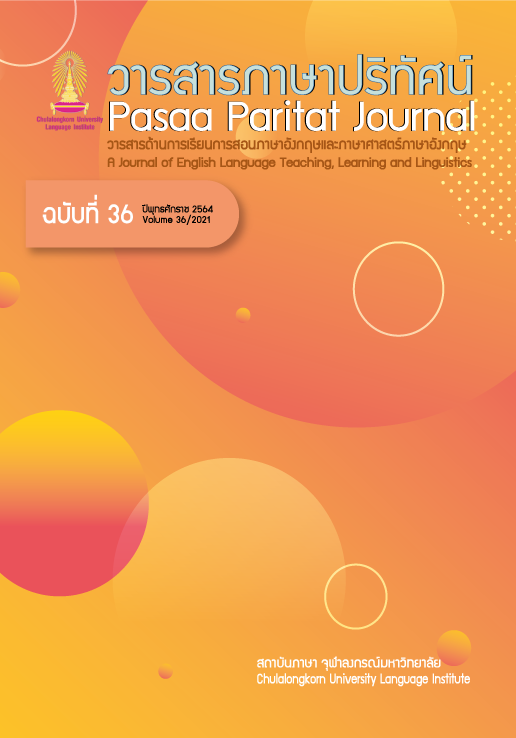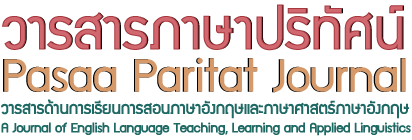Feasibility of Using Community-Based Learning in Thai EFL instruction
DOI:
https://doi.org/10.58837/CHULA.PPJ.36.2คำสำคัญ:
community-based learning, EFL, second language acquisition, Thailand’s educationบทคัดย่อ
It is claimed that the principles in the paradigm shift in second language acquisition has partly been implemented in the EFL (English as a Foreign Language) arena. How to make EFL pedagogies suit the shift then becomes an issue of interest for EFL authorities. In Thailand, such an interest has also been raised. This paper argues that community-based learning (CBL) enables Thai EFL instruction to chime with the shift. Moreover, given some commonalities among the principles in the paradigm shift, the principles in CBL, and the principles emphasised in the 1999 Thailand National Education Act, it could be expected that such integration is realisable in practice. In this paper, aside from a commentary on the integration, pedagogic implications involving CBL activities and roles of teachers in Thai EFL contexts are given and potential challenges discussed.
เอกสารอ้างอิง
Baker, W. (2003). Should Culture Be an Overt Component of EFL Instruction Outside of English Speaking Countries? The Thai Context. Asian
EFL Journal, 5(4).
Bloom, B., Englehart, M., Furst, E., Hill, W., & Krathwohl, D. (1956). Taxonomy of Educational Objectives: The Classification of Educational
Goals. Handbook I: Cognitive Domain. New York, Toronto: Longmans, Green.
Borg, S. (2003). Teacher Cognition in Language Teaching: A Review of Research on What Language Teachers Think, Know, Believe, and Do.
Language Teaching, 36 (2), 81-109.
Brookfield, S.D. (2012). Teaching for Critical Thinking: Tools and Techniques to Help Students Question their Assumptions. San Francisco:
JosseyBass.
Comber, B. (2018). Community-Based Approaches to Foreign Language Education. Colombian Applied Linguistics Journal, 20(2), 151-153.
Demarest, A. (2014). Place-Based Curriculum Design. New York: Taylor & Francis.
Dörnyei, Z. (2014). The Psychology of the Language Learner: Individual Differences in Second Language Acquisition. New York: Routledge.
Dörnyei, Z. & Murphey, T. (2003). Group Dynamics in the Language Classroom. Cambridge, England: Cambridge University Press.
Edwards, J. H. & Liu, J. (2018). Peer Response in Second Language Writing Classrooms. Ann Arbor, MI: University of Michigan Press.
Ellis, R. (2004). 21 Individual Differences in Second Language Learning. The Handbook of Applied Linguistics, 525.
Fischer, G., Rohde, M., & Wulf, V. (2007). Community-Based Learning: The Core Competency of Residential, Research-based Universities.
International
Journal of Computer-Supported Collaborative Learning, 2(1), 9-40.
Fontaine, S. J. & Todd, A. (2011). Community-Based Learning and the International Student. Review of Higher Education & Self-Learning,
(11).
Fry, G. W. (2002). The Evolution of Educational Reform in Thailand. The Second International Forum on Education Reform: Key Factors in
Effective Implementation. Bangkok, Thailand, 2nd to 5th September 2002. Retrieved from:
http://crd.grad.swu.ac.th/data_km/the%20evolution%20of%20education%20in%20thailand.pdf. On December 12, 2019.
Gass, S. M. (2013). Second Language Acquisition: An Introductory Course. New York: Routledge.
Geeslin, K. L. & Long, A. Y. (2014). Sociolinguistics and Second Language Acquisition: Learning to Use Language in Context. New York:
Routledge.
Glossary of Education Reform (2014). Community-Based Learning. Retrieved from: https://www.edglossary.org/community-based-learning/.
On November 19, 2019.
Hall, G. & Cook, G. (2014). Own Language Use in ELT: Exploring Global Practices and Attitudes. Language Issues: The ESOL Journal, 25(1),
-43.
Hutchinson, T. (1996). Project Work in Language Learning. The Language Teacher, 20(9).
Illés, É. (2012). Learner Autonomy Revisited. ELT Journal, 66(4), 505-513.
Inphoo, P. & Nomnian, S. (2019). Dramatizing a Northeastern Thai Folklore to Lessen High School Students’ Communication Anxiety.
PASAA, 57(1), 33–66.
Jacobs, G. M. & Farrell, T. S. C. (2001). Paradigm Shift: Understanding and Implementing Change in Second Language Education. TESL-EJ, 5, 1.
Jacobs, G. M. & Kimura, H. (2013). Encouraging Second Language Use in Cooperative Learning Groups. Beyond Words, 1(1), 23-36.
Jantrasakul, P. (2012). Utilizing Critical Thinking-Based EFL Lessons: A Means to Improve Language Skills and Encourage Student Engagement
in Thai EFL Classes. Journal of Education and Practice, 3(6), 22-32.
Jarvis, H. & Atsilarat, S. (2005). Shifting Paradigms: From a Communicative to a Context-Based Approach. English Language Teaching Journal,
(1), 9-15.
Kabilan, M.K. (2000). Creative and Critical Thinking in Language Classrooms. The Internet TESL Journal, 6(6), 1-3.
Kaewdang, R. (2001). Indigenous Knowledge for a Learning Society. Report of the Sixth UNESCO-ACEID International Conference on
Education. Information Technologies in Educational Innovation for Development: Interfacing Global and Indigenous
Knowledge. Bangkok, Thailand: UNESCO Asia and Pacific Regional Bureau for Education.
Kanoksilapatham, B. (2018). Thainess-Based English Lessons: Reshaping Grassroots English Education. Indonesian Journal of Applied
Linguistics, 8(2), 278-288.
Kanoksilapatham, B. & Channuan, P. (2018). EFL Learners’ and Teachers’ Positive Attitudes towards Local Community-Based Instruction.
Indonesian Journal of Applied Linguistics, 7(3), 504-514.
Lam, R. (2014). Promoting Self-Regulated Learning through Portfolio Assessment: Testimony and Recommendations. Assessment &
Evaluation in Higher Education, 39(6), 699-714.
Legenhausen, L. (2003). Second Language Acquisition in an Autonomous Learning Environment. Learner Autonomy in the Foreign Language
Classroom: Teacher, Learner, Curriculum and Assessment, 65-77.
Lin, M. & Mackay, C. (2004). Thinking through Modern Foreign Languages. Cambridge: Chris Kington Publishing.
Little, D. (2007). Language Learner Autonomy: Some Fundamental Considerations Revisited. International Journal of Innovation in Language
Learning and Teaching, 1(1), 14-29.
Littlewood, W. (2014). Communication-Oriented Language Teaching: Where Are We Now? Where Do We Go from Here?. Language Teaching,
(3), 349-362.
Loes, C. N. & Pascarella, E. T. (2017). Collaborative Learning and Critical Thinking: Testing the Link. The Journal of Higher Education, 88(5),
-753.
Long, M. H. & Robinson, P. (1998). Focus on Form: Theory, Research, and Practice. Focus on Form in Classroom Second Language Acquisition,
, 15-41.
Mann, S. (2005). The Language Teacher's Development. Language Teaching, 38(3), 103-118.
Melaville, A., Berg, A. C., & Blank, M. J. (2006). Community-Based Learning: Engaging Students for Success and Citizenship. Washington:
Coalition for Community Schools.
Moll, L. C., Amanti, C., Neff, D., & Gonzalez, N. (1992). Funds of Knowledge for Teaching: Using a Qualitative Approach to Connect Homes and
Classrooms. Theory into Practice, 31(2), 132-141.
Mooney, L. A. & Edwards, B. (2001). Experiential Learning in Sociology: Service Learning and Other Community-Based Learning Initiatives.
Teaching Sociology, 181-194.
Nieto, Y. (2018). Promoting the Use of Local Literacies in EFL Pre-Service Teachers to Inspire Their Teaching Practice. Colombian Applied
Linguistics Journal, 20(2), 263-273.
Ning, H. (2011). Adapting Cooperative Learning in Tertiary ELT. ELT journal, 65(1), 60-70.
Nomnian, S. (2013). Thai Cultural Aspects in English Language Textbooks in a Thai Secondary School. Veridian E-Journal, Silpakorn University
(Humanities, Social Sciences and Arts), 6(7), 13-30.
Nova Scotia Department of Education. (2013). Community-Based Learning: A Resource for Schools. Halifax, NS: Province of Nova Scotia.
Office of the National Education Commission. (2002). National Education Act B.E. 2542 (1999) and Amendments (Second National Education
Act B.E. 2545 (2002)). Retrieved from: http://www.onesqa.or.th/upload/download/file_85b3d069ddb7d0c591a90
bf774922e35.pdf. On November 5, 2019.
Owens, T. R. & Wang, C. (1996). Community-Based Learning: A Foundation for Meaningful Educational Reform. Retrieved from:
https://pdfs.semanticscholar.org/83e3/0bbd43930de204165fd2a02b41df8959f974.pdf. On November 1, 2019.
Pennycook, A. (2010). Critical and Alternative Directions in Applied Linguistics. Australian Review of Applied Linguistics, 33(2), 16.1-16.16.
Rattanaphumma, R. (2006). Community-Based English Course in Local Perspectives. Retrieved from:
https://ro.ecu.edu.au/cgi/viewcontent.cgi?article=1096&context=ceducom. On November 1, 2019.
Scott, S. & Palincsar, A. (2013). Sociocultural Theory. Retrieved from: http://www.education.com/reference/article/sociocultural-theory/.
On December 3, 2019.
Sharkey, J. (2012). Community-Based Pedagogies and Literacies in Language Teacher Education: Promising Beginnings, Intriguing
Challenges. Íkala, revista de lenguaje y cultura, 17(1), 9-13.
Sharkey, J., Clavijo Olarte, A., & Ramírez, L. M. (2016). Developing a Deeper Understanding of Community-Based Pedagogies with Teachers:
Learning with and from Teachers in Colombia. Journal of Teacher Education, 67(4), 306-319.
Sinclair, B. (2000). Learner Autonomy: The Next Phase. Learner Autonomy, Teacher Autonomy: Future Directions, 3(2), 4-14.
Sinlarat, P. (2005). Changing the Culture of Education in Thai Universities. Higher Education Policy, 18(3), 265-269.
Stein, D. (1998). Situated Learning in Adult Education. ERIC Clearinghouse on Adult, Career, and Vocational Education, Center on Education
and Training for Employment, College of Education, the Ohio State University.
Swain, M., Kinnear, P., & Steinman, L. (2015). Sociocultural Theory in Second Language Education: An Introduction through Narratives
(Vol. 11). Bristol: Multilingual Matters.
Turuk, M. C. (2008). The Relevance and Implications of Vygotsky’s Sociocultural Theory in the Second Language Classroom. Arecls, 5(1),
-262.
VanPatten, B. & Williams, J. (2014). Introduction: The Nature of Theories. In B. VanPatten & J. Williams (Eds.), Theories in Second Language
Acquisition (pp. 13-28). New York: Routledge
ดาวน์โหลด
เผยแพร่แล้ว
เวอร์ชัน
- 2023-07-14 (4)
- 2022-04-12 (3)
- 2022-04-05 (2)
- 2022-04-05 (1)
รูปแบบการอ้างอิง
ฉบับ
ประเภทบทความ
สัญญาอนุญาต
ลิขสิทธิ์ (c) 2022 วารสารภาษาปริทัศน์

อนุญาตภายใต้เงื่อนไข Creative Commons Attribution-NonCommercial-NoDerivatives 4.0 International License.


